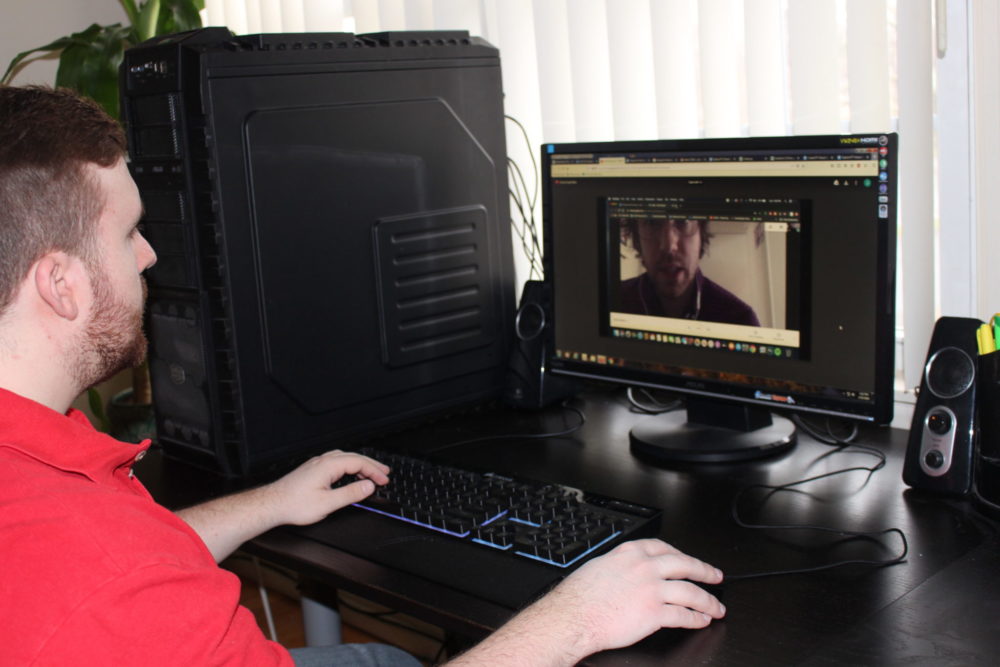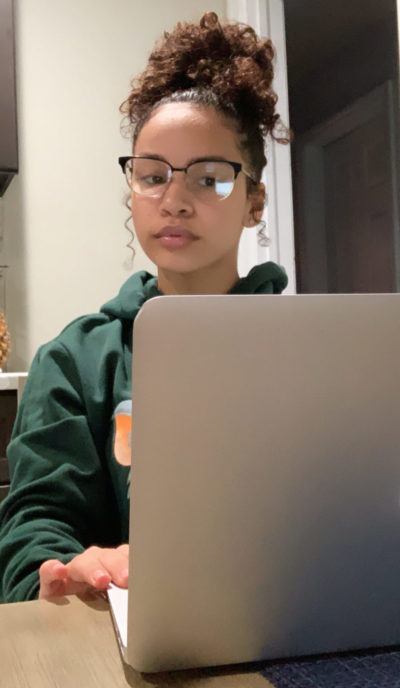
(above) RHS teacher John Marks consults with Technology Facilitator Joseph Mudrak during lesson planning.
When the Classroom Isn’t A Classroom
Lessons Learned by Rahway District Students
Submitted by Rob Kinch
No lockers, no bells, not even a lunch line to navigate, all the vestiges of ‘school’ seem absent to the students of Rahway schools for the moment. That is, all but the need for education. With new challenges come new solutions and the district’s teachers, administration, staff, and students have discovered themselves working together to ensure that learning is indeed counted as present as they transition into the diverse modes of instruction the changing daily social landscape necessitates. There is, however, one constant force in their education of which they may or may not be aware: their Superintendent. Recognizing the myriad questions, concerns, and anxieties of her student body, Dr. Patricia Camp has targeted her focus on reaching out to them directly, and to district staff, to listen and to evaluate how best to proceed in ensuring and maintaining the highest degree of education possible for her district’s youth.
With the progression into at-home, online, and virtual learning, students are experiencing a series of discoveries both in their academic disciplines and in themselves. With the interruption of their daily scholastic routines, how does a student find the balance and the motivation to devote to his or her studies outside of the classroom? Add in the many obligations and limitations students may face daily within the home, and academic responsibilities can become, even for the most diligent student, a much more daunting endeavor. “It’s all about the student’s personal life,” explains RHS freshman Harry Cardona. “I have to watch my siblings and help them with their homework because both my parents work!”
Although affirming that, “As educators we want to ensure that all our students’ education experience continues,” Superintendent Camp remains sensitive to situations such as Harry’s and recognizes that, “we must be mindful of the other factors impacting our students and their families. We are all in the same ‘boat’ together, Harry,” she reassures. “Please communicate with your teachers, as should all our other students, and make sure they know about your specific personal situations. I’m sure they’ll be flexible and assist you in any way they can.”
High school junior Caitlyn Sorber expresses a feeling commonly shared by students of all grade levels. “I have found that sometimes I become overwhelmed; I’m a very old-fashioned learner. The complete switch to online was weird at first, but I’m getting used to it.”
Junior Jamarlia Fuller echoes a similar sentiment, “After a certain hour, I feel like my work becomes a burden that rests on my shoulders until it’s completed!”
“Caitlyn…Jamarlia…first you have to take care of your health,” Dr. Camp compassionately reminds them, recognizing the stress this new academic protocol has engendered. “Next, you have to deal with your family responsibilities. After that, you can focus on your studies.” However, to help deal with those academic anxieties, she is quick to add, “You must make time to have fun! Take walks, read that book that has been collecting dust on your nightstand, or get together online with friends just to hang out together!”
Most noticeably missing from the students’ typical academic day are their teachers; yet by no means can they be marked ‘absent’! Although not physically present, every teacher within the district is working tirelessly to ensure that daily lessons are meticulously prepared and that the lines of communication with each of their students remain open for answering questions, offering support, and (often to the pupils’ dismay) ensuring that they are staying on task! Relationships of the students with their teachers have in many cases been strengthened, with students becoming increasingly aware of the dedication their instructors have for ensuring their success and academic achievement. Rahway Academy 8th grader Ethan Hodge admits, “This has been challenging without my actual teachers…I miss the personal interaction. But all my teachers have been very responsive when I reach out via email. Mr. Sorrentino even called to inquire how I’m doing…that was very nice!”
On a more philosophical note, high school junior Victor Motino observes, “I feel that there has always been a barrier of disconnect between most students and teachers throughout the school year; I think this situation has enlarged that barrier. However, the faculty and students alike have been working very hard and have come together to fill in the gaps. Together we are helping to nurture the learning of all our students.”
High school senior Andrew Santacruz offers, “I feel like this has fortified our teacher-student relationship because we have been in contact more than ever and they continue to worry for all their students and their well-being.” However, despite all the emails and the ‘virtual’ classrooms, 9th grader Natalia Abreu is quick to affirm, “Nothing takes the place of my teacher!” Senior Miguel Garcia knows why: “No sort of at-home work can compare with face to face interactions with instructors who are passionate about what they teach.”
However, despite the numerous hurdles this new academic protocol presents, students are creatively problem solving in a host of practical ways in order to surpass them. Junior Stephanie Ferreira notes, “I struggle with time management and staying on task, so I make sure to limit my distractions such as turning off my phone completely and having everything I need near me so I won’t get up and waste time.” Caitlyn Sorber has “made a weekly assignment tracker so I can see what’s due when.” Junior Andres Barco-Cardona who admits, “Lack of discipline to complete my assignments is my biggest challenge,” created his own ‘teacher’ substitute. “I have asked my parents to overlook my progress and push me to complete them just like my teachers do in school!”
Has this temporary foray by students into a non-traditional classroom experience influenced their concept of education? Miguel Garcia recognizes “great value in taking time away from the school classroom to self-study and to understand and implement in my daily life the different concepts I learn.”
“I discovered that we are able to learn regardless of any challenge we may face,” avers Andrew Santacruz or, as Ethan Hodge sees it, “even in a crisis.”
Superintendent Camp voices her appreciation for their personal discoveries as she shares with them that, “Your insights, gentlemen, demonstrate your recognition that our overall educational goal during this time is to help move all of our students forward!”
In the end, the best advice to help students find success during this new ‘normal’ comes from our students themselves; they are eager and ready to pass along some useful hints to all their classmates within the district. “Avoid procrastinating,” warns Jamarlia Fuller. “It will lead to your having added stress; use your time wisely and make a plan!” Andrew and Caitlyn agree that students “should not take this as a break,” and both emphasize, “Stay home and do your work.” Natalia Abreu advises, “It is important to reach for what you want in life; every student of every age has a future and should want to pursue it.” Ever succinct and unwaveringly pragmatic, Harry Cardona puts it quite simply. “Wake up everyday like there is school and go about your classes like you normally would!” No doubt, his Superintendent would strongly agree.
Photos by John Marks and Natalia Abreu, Rahway Public Schools.

(above) Freshman Natalia Abreu strives to remain current with all her assignments.

